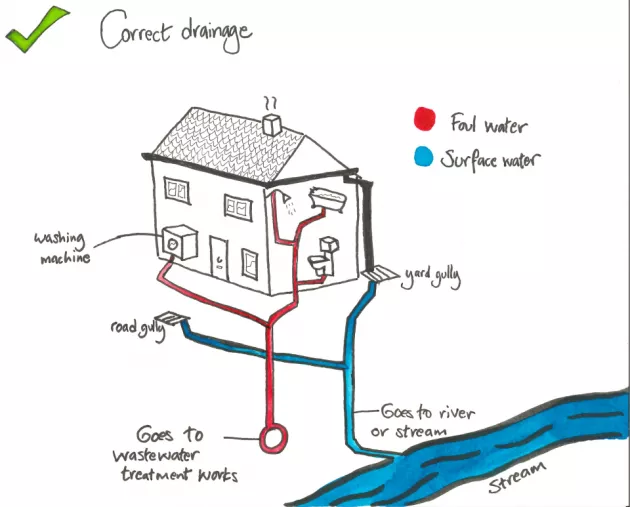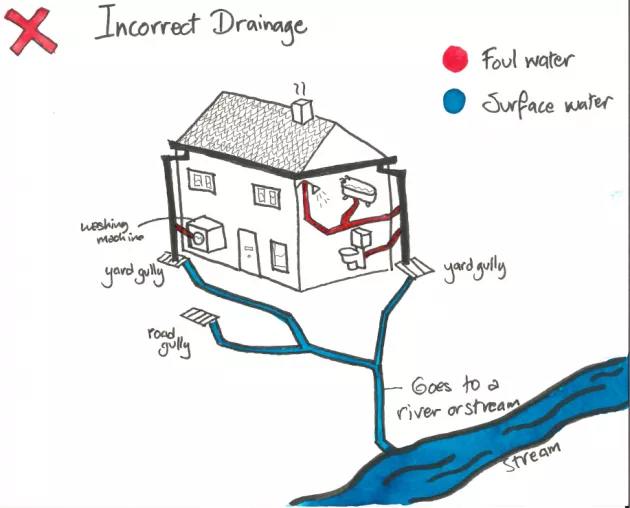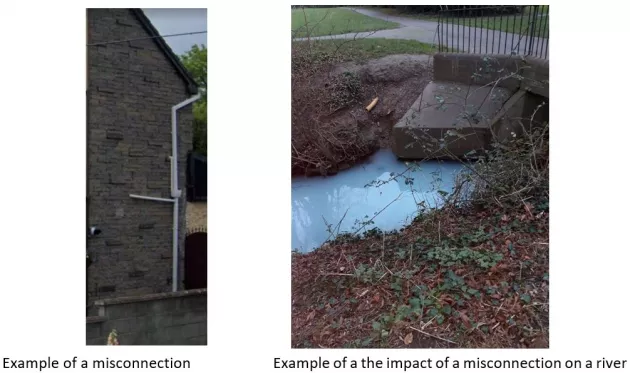Misconnection Programme
Dublin City Council conducts domestic and commercial misconnection inspections under the Water Pollution Act 1977, as amended. A misconnection occurs when a foul drain is incorrectly plumbed to the surface water network, causing pollution of local rivers and streams. Removing misconnections helps reduce contamination and improve water quality.
A property is typically serviced by two types of drains namely foul and surface water. The foul drain conveys wastewater from foul appliances such as washing machines, dishwashers and toilets to the wastewater treatment plant. While the surface water drain conveys “clean” rainwater to local rivers and streams. A misconnection occurs when a foul drain is incorrectly plumbed to the surface water network, causing pollution of nearby surface waters.


Misconnections can occur during construction or renovation where a foul drain is incorrectly plumbed into a surface water drain. It can also commonly occur if an existing foul appliance is moved to a new location i.e. moving a washing machine from a kitchen to an outbuilding.
Misconnections result in foul wastewater entering our waterways, which can have a serious and sometimes detrimental effects on water quality and flora and fauna.

To limit pollution of rivers and streams, Dublin City Council carry out misconnection inspections across the City. Prior to an inspection, Dublin City Council will issue you an intent to inspect letter. On the day of inspection, Dublin City Council staff will notify you of the intent to inspect and have ID cards for proof of identification.
In the first instance, the inspection will consists of the review of drainage pipes on the outside of your property. In some cases if a misconnection is suspected or where your property is terraced or has internal drainage, a dye test may be required to complete the survey. A survey on average takes 15 minutes in total to complete.
If a misconnection is found, Dublin City Council notify the property owner in writing, outlining what appliance/s was found to be misconnected and the timeframe for which it should be rectified.
It is the responsibility of the homeowner to rectify a misconnection, even if this misconnection was made by a previous owner. Connecting it right first time prevents rectification costs, potential fines, and pollution.
Frequently asked questions:
A misconnection occurs when a foul drain is incorrectly plumbed to the surface water network, causing pollution of nearby surface waters.
A good place to start is to inspect your rainwater downpipes. If there is any additional pipework connected to the downpipe, this could indicate a misconnection. If you suspect you have a misconnection, a member of Dublin City Council can confirm it for you by carrying out a dye test on the suspected misconnected appliance.
It is the responsibility of the property owner to rectify a misconnection. If you rent the property, you must advise the landlord of the need to rectify this.
This may not seem to be as big of an issue, but the chemicals & detergents can still have a detrimental effect on the flora & fauna in the rivers, and therefore, the rectification of these is equally important.
You will be in contravention of relevant articles of the Water Pollution Act 1977, as amended. Dublin City Council would encourage you to cooperate with the Water Pollution Control section to avoid legal action.
This is case specific. Dublin City Council can provide advice about how to correct it, where possible. In the first instance, you should seek the advice of a competent plumber.
The Water Pollution Control section manages the misconnection programme within Dublin City Council. You can contact the team on [email protected] or via Customer Services on 01-2222222.